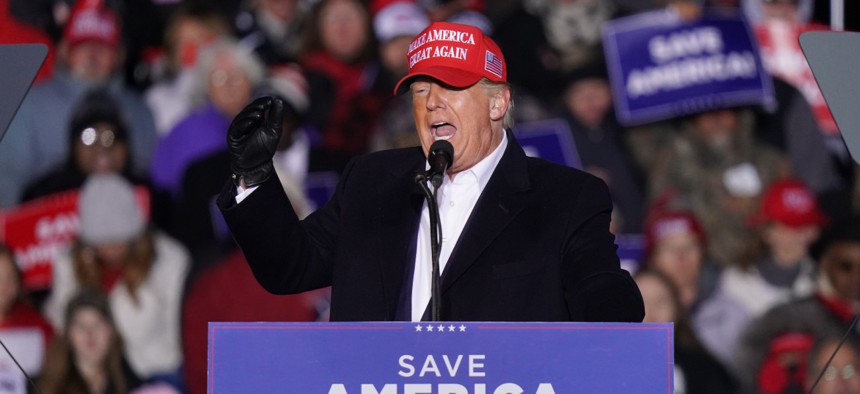Trump Is Threatening the Return and Expansion of Schedule F
The former president, who is reportedly mulling whether to launch a bid to return to the White House, told supporters Saturday that the president should be able to fire any executive branch employee at will.
Former President Trump over the weekend effectively advocated for the demolition of the nonpartisan federal civil service system, providing the latest indication that while President Biden halted the abortive effort to cancel the civil service protections of “policy-related” federal workers, the fight over merit systems principles is not over.
The remarks came Saturday at a rally held by the former president with supporters in South Carolina. Trump reportedly is mulling whether to run against Biden again in 2024.
“We will pass critical reforms making every executive branch employee fireable by the president of the United States,” Trump said. “The deep state must and will be brought to heel.”
The proposal marks an escalation from the controversial executive order Trump signed in October 2020 that sought to remove career federal workers in “confidential, policy-determining, policy-making or policy-advocating” jobs from the General Schedule into a new job classification where virtually all of their civil service protections are absent, essentially making them at-will employees. Although the Trump administration began efforts to reclassify jobs into the new Schedule F, they ultimately were unable to move any workers before January 2021, and Biden quickly signed an executive order rescinding the edict.
Members of the Trump administration did push for more sweeping approaches to the federal civil service, however. Then-Domestic Policy Council member James Sherk recommended as part of an internal laundry list of policy proposals that officials seek legal justification for what he called the “Constitutional option,” a legal theory that the president has power through Article II to dismiss any federal employee for any reason. Last year, Sherk published a report reiterating that proposal for the America First Policy Institute.
Earlier this year, Donald Moynihan, Georgetown University’s McCourt chair of the McCourt School of Public Policy, published a report in the Public Administration Review on the looming dangers that populists and conservatives who subscribe to the so-called unitary executive theory could pose to the civil service system. Moynihan said in an interview that although it can be hard to discern whether Trump would “literally” make federal workers at-will employees by executive fiat, it seems likely that at the very least he would seek to reinstitute Schedule F on Day 1 of a second presidential term.
“He may not be talking about a really well-defined and specific plan, but there is an intent there to do something,” Moynihan said. “Now that he’s been president, and while he might not have a piece of civil service legislation ready to go, I think if he’s elected, he would actually do something very large and consequential for the civil service system. And I think the big difference is I think he would do it on Day 1, rather than waiting until the last couple of months of his term.”
Moynihan added that the threat does not come from Trump alone. Even if he does not run, several candidates will seek to fill the same populist lane that he did, and some members of Congress have already spoken positively about Schedule F as a “needed” reform.
Don Kettl, professor emeritus at the University of Maryland and former dean of its School of Public Policy, said that while the dangers of returning to the spoils system of the 19th century were heavily discussed during the Schedule F debate, a less-understood result of stripping federal workers’ civil service rights could be the degradation of the government’s ability to deliver services to the public.
“That’s really the core question: the fact is there are things that we want and expect government to do, and we want and expect the government to do it in a way that doesn’t have a partisan tinge, and to be able to do that, the government needs a certain capacity,” he said. “It’s a question of mission, and there are lots of things that we do take for granted in government work, whether that’s air traffic control, distributing Social Security checks, providing basic research or even the fundamentals of environmental protection.”
Correction: This piece originally stated that the America First Policy Institute had removed a report advocating for at-will federal employment from its website, when the report had changed locations on its website.
NEXT STORY: Data and the Cyber Workforce




